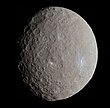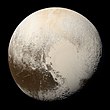(470599) 2008 OG19
Appearance
| Discovery | |
|---|---|
| Discovered by | Palomar Observatory team |
| Discovery site | Palomar Observatory |
| Discovery date | 30 July 2008 |
| Designations | |
| (470599) 2008 OG19 | |
| 2008 OG19 | |
| scattered disc | |
| Orbital characteristics[1] | |
| Epoch 13 January 2016 (JD 2457400.5) | |
| Uncertainty parameter 3 | |
| Observation arc | 2596 days (7.11 yr) |
| Aphelion | 94.004 AU (14.0628 Tm) |
| Perihelion | 38.576 AU (5.7709 Tm) |
| 66.290 AU (9.9168 Tm) | |
| Eccentricity | 0.41807 |
| 539.73 yr (197137 d)[1] | |
| 1.5681° | |
| 0° 0m 6.574s /day | |
| Inclination | 13.167° |
| 164.02° | |
| 140.53° | |
| Physical characteristics | |
| Dimensions | 619+56 −113 km (assuming albedo of 0.081)[2] 394+57 −63 km (assuming albedo of 0.199)[2] |
Mean density | 0.609±0.004 g/cm3[2] 0.544+0.042 −0.004 g/cm3 (minimum)[2] |
| 8.727±0.003 h[2] | |
| 0.081 (assumed as typical SDO albedo)[2] 0.199 (assumed)[2] | |
| V–R=0.64[2] | |
| 4.39±0.07 (R-band)[2] | |
(470599) 2008 OG19 is a trans-Neptunian object and a possible dwarf planet located in the scattered disc.[3] It was discovered on 30 July 2008 through the Palomar Observatory.[4] It displays a large light curve amplitude of 0.437±0.011 magnitudes, implying that it is highly elongated in shape, similar to 20000 Varuna. Based on models for its light curve amplitude, they obtained an approximate density of 0.609 g/cm3 and aspect ratios of b/a = 0.513 and c/a = 0.39.[2]
References
- ^ a b "JPL Small-Body Database Browser: 470599 (2008 OG19)" (2015-09-08 last obs.). Jet Propulsion Laboratory. Retrieved 1 August 2017.
- ^ a b c d e f g h i j Fernández-Valenzuela, Estela; Ortiz, Jose Luis; Duffard, René (2015). "2008 OG19: A highly elongated Trans-Neptunian Object". Monthly Notices of the Royal Astronomical Society. 456 (3): 2354–2360. arXiv:1511.06584. Bibcode:2016MNRAS.456.2354F. doi:10.1093/mnras/stv2739. S2CID 73720001.
{{cite journal}}: CS1 maint: unflagged free DOI (link) - ^ "List of Known Trans-Neptunian objects". JohnstonsArchive. Retrieved 12 April 2015.
- ^ "470599 (2008 OG19)". Minor Planet Center. Retrieved 1 August 2017.
External links


